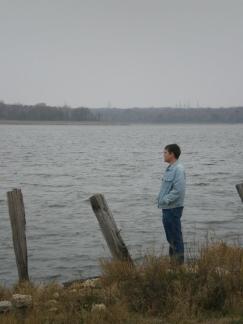 How long must we all wait to change,
How long must we all wait to change,
This world bound in chains that we live in,
To know what it is to forgive,
And be forgiven?
– Kenny Loggins
Deep in my soul, beyond the reach of age or reason, they will always and forever be “aminals.”
Nothing reduces me to the quivering excitement of a three-year-old like encounters with woodland creatures (or any creatures, really). I want to run at them, capture them, be close to them. Not to hurt them, mind you; I just love them, with every fiber of my being. I am intrigued by them; I want to share in their space, in their existence. To touch, and to be touched by them. To be, in essence, one with them.
I am fascinated by the spark of life we share.
This little guy and I had our moment one early morning last month at Lake Powell Resort in Page, Arizona. I got up just after sunrise and took off down a trail that stretches east from the resort proper, and found myself in a scene out of Watership Down. There were jackrabbits everywhere. At one point I stopped and lay down on the pathway, in the hopes of getting a decent shot of this guy, and as I lay there, he decided to up the ante. Apparently, I intrigued him greatly. Slowly, he made his way toward me, one hop at a time, until I could have reached out and touched him. And there we were, inches from one another, man and bunny rabbit, staring and being stared at.
Time stood still.
For the briefest of instants, there was no line, no distinction between man and animal. We were simply together, sharing the nature we each inhabit, that belongs to us both. And then it was over: another morning stroll broke the sacred spell, and as the stranger rounded the bend in the trail, my sylvan friend headed for the brush. But fleeting as it was, it was a magical moment. It was a fearless moment, a moment free of the constant conflict that plagues humanity’s interactions with the natural world. It was quiet; it was present; it was real.
I’ve often noticed how rarely those three adjectives apply. Perhaps it’s my imagination, but it seems we are determined to fill all the quiet moments with noise. Of course, this may just be a case of common rudeness: the longer I live, the more bullish people around me become, and the whole world’s a china shop. We seem incapable of silence, of awe. Maybe it’s just rudeness, inconsideration, but I have to wonder whether there’s a deeper meaning in all this.
Could it be that we’re afraid? Could it be that the magnitude of the natural world reminds us just how tiny and insignificant we really are, of just how brief a moment we occupy? If history is a book, then I am a footnote–and not even a good one. No juicy tidbits; no “see” references. Just a page number, with maybe an “ibid” leading the way. Same as before: different face, maybe, different name, but basically just more of the same.
Walking the beaches of Lindisfarne; staring into the vast depths of the Grand Canyon; even contemplating the pastures on the family farm in Missouri–I’m reminded of the fleeting nature of Me. So many have gone before; so many more will follow after. I matter, yes, but I matter in that I do not. You’ve heard my mantra before: it’s not about Me. If anything, I am about it.
Back to my encounter with Bunny Foo-Foo: the moment itself was predicated upon silence, stillness. Respect. I identified with him, and he with me. We shared the space–no need for domination cum “stewardship.” The Daniel Boones of the world are great, but so are the Tom Bombadils. I don’t want to shout at the world, or subdue it; I want to sing to it, to see it dance in response, and to dance along with it.
I could have reached out and touched him. And I wanted to, desperately. I wanted to pull an Elmyra, and squeeze him till he popped. Deep down inside, I always want to do that, whether it be a deer by the side of the road or a squirrel in my back yard. I want to jump up and down and holler “Bunnybunnybunnybunnybunny!”
At times like these, I have to grab my inner child and bop him on the head. Or at least stifle him a bit. Teach him to be quiet and live the moment at hand. To bow before the life that surrounds him on every side; not to fear it, not to subjugate and conquer, but to embrace it as a reflection of himself, as a part of himself.
If “God” is anything, it is this mutual recognition, life speaking to life, moment to moment, without interruption. From man and animal to man and man, person to person, in the wild or in the checkout aisle. Life speaking to life. Not in anger or in arrogance, but in love.
To be with nature as one is with a lover, a friend, a wife, a husband, oneself–to do unto that Other as I would have done unto me. This, to me, is the only religion that matters, and the only one that’s real.
Speak softly. Life will answer.









